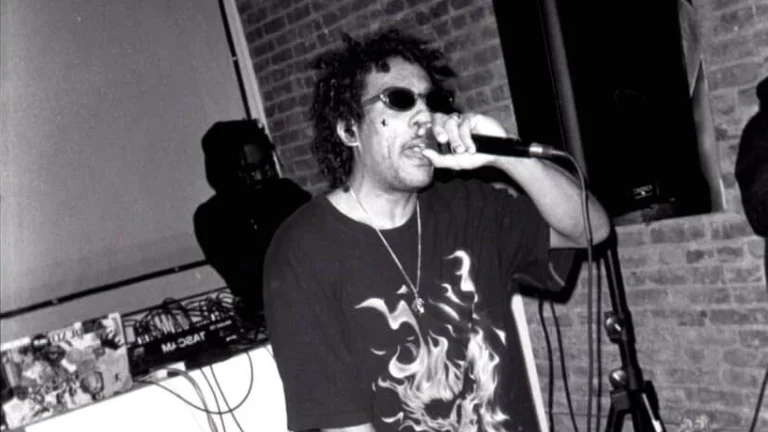ElCamino begins his newest album, They Spit on Jesus, with a vulnerable statement: “We’ve been through the worst.” This opening line, delivered in a surprisingly smooth and soulful singing voice, prepares the listener for an album characterized by introspection and raw honesty. Mere seconds later, the artist switches modes completely. Atop a thumping boom-bap beat with punchy drums and delicate strings, he proudly speaks about his ability to succeed as a rapper and on the streets. One particular line serves as an effective summary of the album’s main theme: “They spit on Christ, why would they give a fuck for me?” This line, harshly delivered and poignant in its suggestion that our individual lives are practically meaningless in the face of figures like Christ, has a toughness that captures the album’s sound and its ideas in one brief, brilliant moment.
That sharp tone is maintained throughout the rest of They Spit on Jesus, meeting the expectations for any record coming from the Black Soprano Family—who closely affiliate with Griselda. The track “80 Bills” exemplifies the album’s gritty tone perfectly. Produced by Optivision, the song begins with eardrum-bursting 808s and carries an uncompromising modern trap sound. The lyrics are along the lines of what Griselda fans would anticipate: feature artist Benny the Butcher raps about picking up women, “put[ting] shit on just for the pic,” and explaining he is “in the trenches.” The instrumental is intense and confrontational, the rapping is highly energetic, and the flows demand attention with their unpredictable edge. The ad-libs—typical of Griselda and their members—are attention-grabbing in their variety, from repeated lines to vocal sound effects, adding to the flavor and atmosphere of the song. ElCamino’s verse is especially impressive, seeing him change his rhythm multiple times while never losing the beat. If anybody were to select one song to bring attention to on They Spit on Jesus, it’d have to be “80 Bills.” It’s a perfect rap single—a booming instrumental, an undeniably catchy hook, and two fantastic verses highlighting the talent of the rappers most involved in the album.
Also, there is a clear sense of being victorious throughout the album as ElCamino celebrates escaping the rough neighborhood where he grew up. The album’s second track, “New Bill,” features triumphant horns and a repeated vocal sample of a woman singing “amen” as the backing to jubilant verses from ElCamino and Benny the Butcher. ElCamino raps about his adolescence, mainly discussing its harsher elements. He draws particular attention to where he learned his most impactful life lessons—from reverends as opposed to letting “a n**** lecture [him] who never made it big.” ElCamino has strong chemistry with Benny the Butcher, who bursts onto the track with a verse focused on his own successes. His punchlines are beautifully and passionately delivered, and his words are inspiring as he exclaims, “I left home and only had a couple dollars, I can’t front / but this rate I’m going, I’ll probably buy an island in a month!” ILL Tone Beats, responsible for the majority of the album’s instrumentals, produces a distinctive backing for the two artists to showcase their talents over. In this case, the horns and vocal samples bring a nostalgic mood, furthered by boom-bap drums and the rappers’ focus on their pasts.
Perhaps more important than that is the song’s outro, which sees Benny the Butcher reverse the bleak nature of the idea of spitting on Jesus. He says, “why wouldn’t they hate on you? They spit on Jesus! They hated Malcolm, man.” This line, which may not seem especially important, alters the idea of being insignificant compared to Christ from a thought of unworthiness to a much more encouraging statement. It is less that nobody cares for those who aren’t martyrs and more that everybody has their own tribulations to survive. Instead of seeing himself as unworthy of love because of his failings and difficulties, Benny the Butcher suggests that even ElCamino’s role models are disrespected and have significant hardships. It’s a small moment on the album, but it is a life-affirming shift in perspective.
ElCamino makes a clear effort to diversify his sound and prove his versatility throughout They Spit on Jesus. Though he ensures that the album has crowd-pleasing bangers, such as the aforementioned “80 Bills,” other tracks show a more exposed side of the artist. “Neva Gon Change” is a chipmunk soul song that sees the album’s pace slow down and its focus shift to ElCamino mourning the loss of his sister. There is an abundant tenderness to this track, and its sincerity makes it deeply emotional. Still, ElCamino shows that his sister’s death taught him more about life and himself as he raps about being motivated by his loss to push harder in the hip-hop industry.
The album’s closer, “The Best of Me,” is orchestral and epic. Backed by various stringed instruments and a choir, ElCamino talks about how he came to understand and continues to drive himself. He says, “I swear I knew I was royal when I ain’t have a thing,” and shows that he has come to have gratitude for that which he does have. It’s a massively uplifting and grand finale to an album entertaining a wide range of emotions.
While Griselda fans will find what they’re looking for in They Spit on Jesus, what makes ElCamino’s album memorable and refreshing is the impressive various styles and sounds. In particular, his charisma and his raw honesty with the listener make this record stand out. They Spit on Jesus is an album that directly and sincerely reflects ElCamino’sreality—triumphant one moment, potentially tragic the next.





